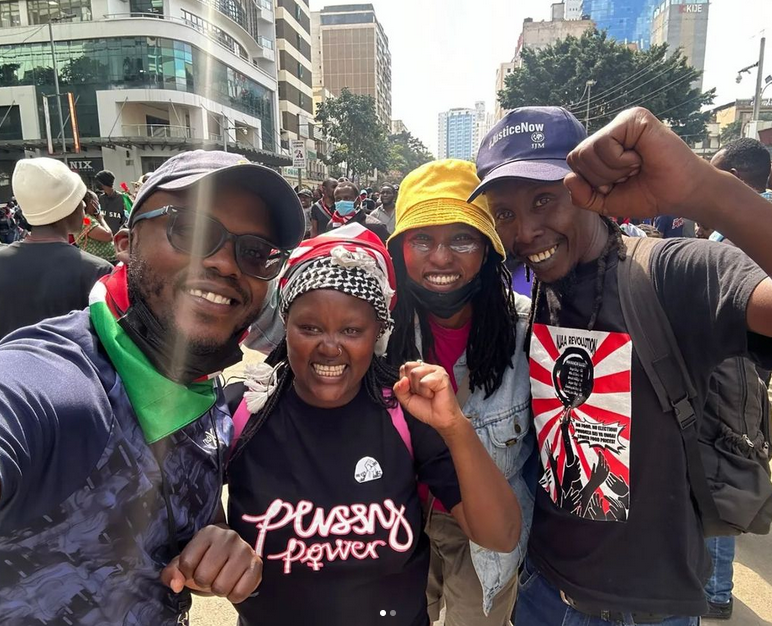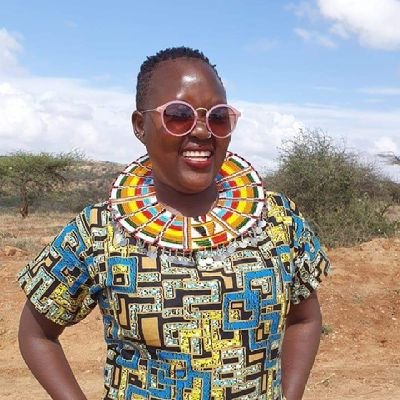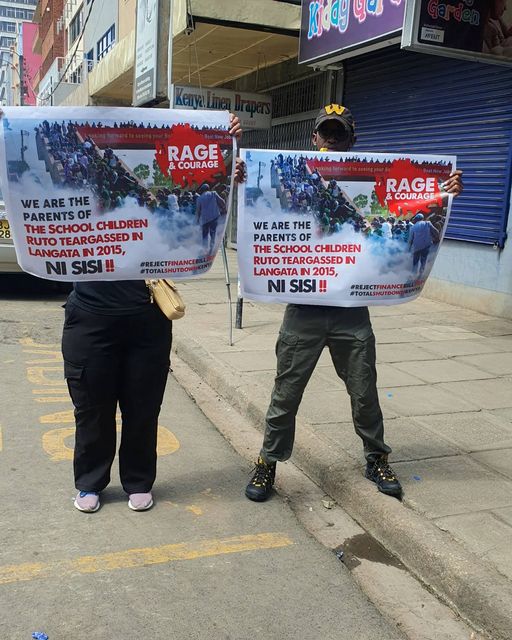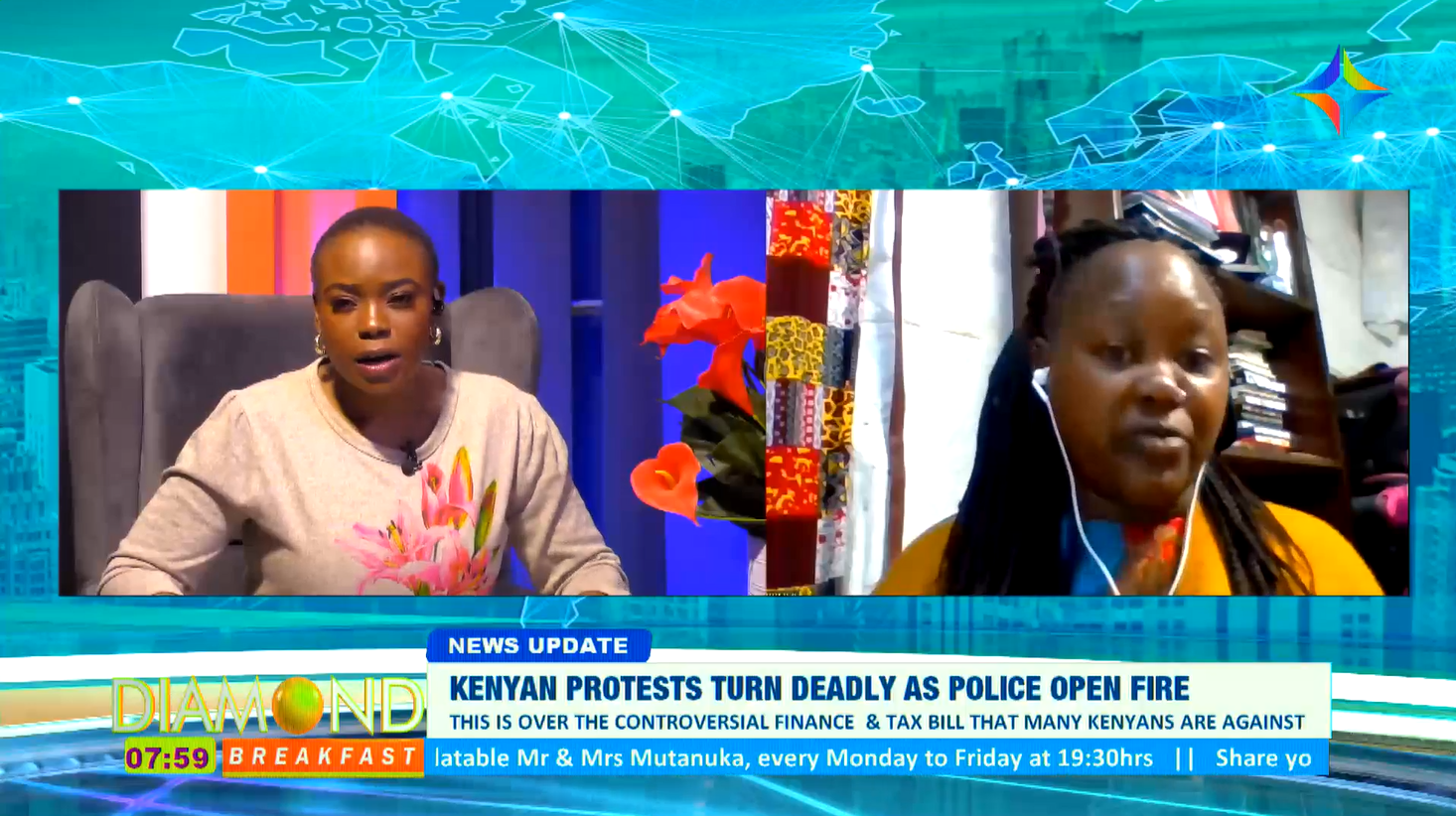
Photo: Rachael Mwikali (private)
Voices from the South Newsletter
This interview was based from an internal Karibu Foundation event, held on July 3rd 2024.
The text was edited and condensed for clarity, and it was partially edited using AI-tools.

Rachael Mwikali
Rachael is a human rights defender, pan-African feminist, and Convener at “Coalition for Grassroots Human Rights Defenders – Kenya“
Interview with Rachael Mwikal
KARIBU: Can you start by telling us about the origins of these protests?
Rachael: The protests began on 18th June 2024, primarily led by young people – especially the Generation Z. Since June, over 25.000 Kenyans have taken to the streets.
This movement is unique because it is organized both online (#RejectTheFinanceBill2024) and offline, encompassing a broad range of participants from different sectors of society. It’s a protest that is happening in both Nairobi, but also out in many of the regions of the Kenya – this isn’t just an urban protest. More than 30 counties out of 47 counties in Kenya have participated and organized themselves organically.
The main catalyst is the Finance Bill 2024, an International Monetary Fund (IMF) backed bill that increases our debt without supporting social justice. It fails to provide basic needs of Kenyans such as rights to education, heath care, and SRHR services (including the raising cost of menstrual and hygiene products). And it fails to address the significantly raised cost of living in Kenya.
The Finance Bill is controversial because it imposes new taxes at a time when Kenyans are already struggling. It’s driven by conditions imposed on Kenya by the IMF – disregarding the local economic context and the well-being of citizens. Debt controls by these international institutions are choking us.
This bill increases the financial burden on everyday Kenyans without providing corresponding benefits or social safety nets. The president’s push to double tax us, alongside new taxes on content creators and online activities, exacerbates the situation.
But the protest must to be seen in the context of other critical issues facing Kenya, that continues to make Kenyans angry and contributes to people joining the strike. Additionally, we faced floods, forceful evictions, femicide cases, doctors strikes, and poverty, yet the president remained silent. We’re facing a shrinking civic space, and the government has consistently been anti-choice and anti-gender. The movement has grown to include the middle class, reflecting a significant intersectionality of issues affecting all Kenyans.
This inaction has driven people to the streets to demand change.
You mentioned the shrinking civic space. Can you explain what this means and how it affects the situation in Kenya?
Shrinking civic space for us means increasing restrictions on the ability of civil society, social movements and Women/Human Rights Defenders to operate freely operate freely. This includes laws that limit freedom of assembly, speech, association, and the press, as well as the targeting and harassment of activists and the movements /organizations they are part of.
For our movement, it means constant surveillance, arrests, threats, and a general atmosphere of fear. It’s challenging to organize and mobilize when the government is actively trying to suppress any form of dissent.
In addition, we see other bills in Kenya – for example the “Public Benefits Organizations Act (“PBO Act”) of Ministry of the Interior – that affects civil society. The PBO Act was passed with the claimed purpose of improving the way that civil society can operate. Yet despite the bill being passed, we still experience a very harsh civic space, where the president of Kenya has labeled peaceful protesters as criminals. We have seen cases of abduction, extra judicial killings and arbitrary arrests.
This repression is not isolated to Kenya; we see similar tactics being used by other regimes in the region. We see misinformation and disinformation being used to discredit the movement
At the end of the day, what we are doing is speaking out about social justice. Yet what we are seeing are cases where fellow activists or human rights defender have been targeted or arrested, because they’re there to talk about human rights work and social justice.
“At the end of the day, what we are doing is speaking out about social justice. Yet what we are seeing are cases where fellow activists or human rights defender have been targeted or arrested, because they’re there to talk about human rights work and social justice.”
Can we describe this a “generation Z” protest movement?
To a certain extent, but we also see that intersectionality is central to our movement. The Finance Bill affects everyone, but marginalized groups like women and the poor are hit the hardest. We are also addressing broader issues like femicide, privacy violations through data security laws, and other forms of systemic injustice.
By highlighting these interconnected issues, we are building a more inclusive and comprehensive movement. This is now a movement being collectively lead by all Kenyans, not just Generation Z.
How has the government responded to these protests?
The response has been harsh and repressive. Over 30 people have been killed, and more than 600 have been arrested. And our hearts are with the families that have lost loved ones.
The protests were met with police brutality, including the use of live ammunition. This violence has unfortunately escalated tensions, leading some protesters to feel the need to defend themselves.
Despite this, the majority of the movement remains committed to peaceful protest.
What are the key demands of the movements and activists?
Our demands include that the Finance Bill be stopped. Even if the president has not signed it, it is still passed by the parliament – and we need to keep watch on this.
We also need to hold the decision-makers accountable beyond just this bill. We need our elected officials – our members of parliament – to know that they are accountable to us and need to listen to us. For us, this movement is Kenyans being in solidarity with other Kenyans. As rights holders, we need decision-makers that are accountable and that represent the voice of the people.
We also call for accountability on police violence, and an end to the repression of civic space. We also call for a feminist perspective in policymaking to ensure that all voices are heard and represented.
We also need to work on narrative work – protesters and activists cannot be seen as criminals. We need room to operate, and to challenge this narrative.

Photo: Coalition of Grassroots Human Rights Defenders – Kenya
How can the international community support the protesters’ cause?
The international community can support us by speaking out against the repression, putting diplomatic pressure on the Kenyan government and the African Union, and supporting local civil society organizations.
We need global solidarity and pressure on the Kenyan government from the international community to respect human rights and democratic processes. There are issues bigger than the Finance Bill, and we need people to see this. This is a call for comprehensive economic justice in Kenya.
We need resources to continue our work. And we need legal and moral support to protect activists who are at risk.
By standing in solidarity with us in this cry, the global community can help amplify our voices and push for meaningful change.
What is the outlook for the future of these protests and the movement?
Despite the challenges, we remain hopeful.
The protests have united Kenyans across different demographics, showing a collective desire for change. We believe that our efforts will not be in vain and that we can achieve a more just and equitable society.
The continued resilience and solidarity of the Kenyan people give us strength to keep fighting for our rights and our future.
Interested in learning more?
On June 26th 2024, Rachael was also interviewed by the Zambian “Diamond TV” network on the protest in Kenya. You can view this interview on Facebook here at the 1 hr 14 min mark.

